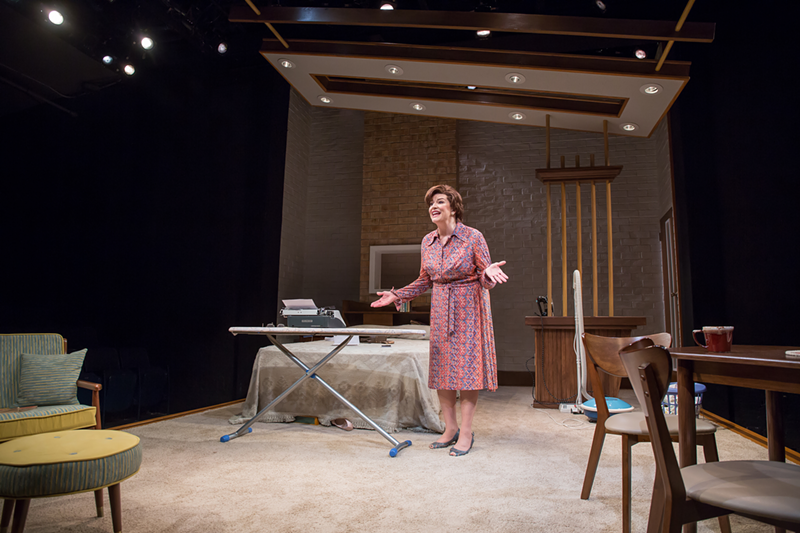I had heard the name Erma Bombeck countless times in my life without having much context; Bombeck’s career as a humorist picked up steam in the 1970s and continued until her passing in the late ’90s. This is where plays such as At Wit’s End are useful, serving as an entertaining opportunity to bring a new generation up to speed while providing a blast from the past for anyone already familiar.
For the initiated — and judging by the uproarious laughter on opening night, that was most of the audience — At Wit’s End is filled to the brim with Bombeck’s signature one-liners and aphorisms. “Never go to a doctor whose office plants have died,” she quips, or “God created man, but I could do better.” (Fear not, it would be difficult to spoil the show’s jokes; Margaret and Allison Engel’s script is absolutely rife with them.) This is the audience that will enjoy At Wit’s End the most — gags about penny loafers and rotary phones seemed to hit their marks.
For those of us less familiar with Bombeck, this 65-minute play provides an overview of her truly robust career. Bombeck began her weekly newspaper column, which documented the life of the suburban housewife, at $3 per story. Her mix of candor and humor quickly found an audience, and ultimately Bombeck’s columns were syndicated to 900 papers across North America. She published 15 books, made frequent television appearances and served as grand marshal for the Rose Parade.
Bombeck was more than a puff writer — she gave a voice to a marginalized population of wives and mothers just as the women’s movement developed. On top of her writing, she traveled the country for two years championing the Equal Rights Amendment, a proposed addition to the U.S. Constitution guaranteeing equal rights regardless of gender.
Actress Barbara Chisholm embodies Bombeck with spirit and cheer. Chisholm has a fluid comedic timing and an authenticity that becomes important when the tone eventually (and briefly) shifts to address Bombeck’s critics, health problems and eventual passing. Even these serious topics are handled with Bombeck’s brand of sincerity and wit; the show feels lighthearted from start to finish. (In fact, the Engels’ script allows Bombeck to interrupt the end of her own show, shoehorning in a few final jokes.)
At Wit’s End is a one-woman show that requires Chisholm to interact with offstage children, impersonate an oblivious husband and hold one-sided conversations with a door-to-door salesman. The actress’ knack for characterization and impression keeps these interactions clear and funny, populating the stage with a cast of characters from Bombeck’s life.
Chisholm’s delivery also makes it clear that Bombeck’s jokes and snark come from a place of deep love. Bombeck comes off as a woman who cherishes being a mother and housewife; she simply wants those roles to be appreciated or even simply noticed. She is also a successful and influential writer alongside, not instead of, being a mother. In the program book, the playwrights suggest they were “amazed by her discipline in finishing deadlines before her children came home each afternoon.” Who can say how many women were inspired by the revolutionary balance that Bombeck struck between her career and home life?
At Wit’s End previously has been produced at Washington, D.C.’s Arena Stage, and Robison commented that mounting it in Cincinnati feels to him and director David Esbjornson “like bringing it home.” Not only are the script’s authors Ohio natives, but Bombeck herself hailed from Dayton and first published her column in Dayton’s Kettering-Oakwood Times. The opening night audience was even treated to a surprise visit from Bombeck’s daughter Betsy. Bombeck’s writing struck a familiar chord in households across the country, but there is a special poignancy in celebrating a hero with local roots.
ERMA BOMBECK: AT WIT’S END runs through June 18 at the Playhouse in the Park. More info/tickets at cincyplay.com.






